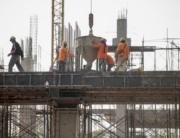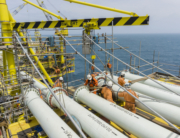A person who suffers injuries in a forklift accident on a construction site in Florida can collect damages from the liable parties. The kind of compensation you can receive will depend on several factors.
What We Have to Prove to Hold Someone Liable in Negligence for a Forklift Accident on a Construction Site
We must prove the following for a successful injury claim:
1. Legal Duty. The person or company we’re filing a claim against must have had a legal duty toward you. If you worked on the construction site or were there for some other lawful purpose, the property owner and general contractor owed you a duty of care to keep the premises safe. Subcontractors have a duty of care to operate in such a fashion where they do not cause injury to others.
2. Breach of the Duty of Care. If someone did not perform up to the standards of the applicable duty of care, that person or company is negligent.
3. The Breach Caused the Accident. Negligence by itself does not make one liable. The negligence must be the cause or one of the causes of the accident.
4. You Sustained Damages. You must have physical injuries to win a negligence case in Florida. A close call with no physical injuries will not suffice.
How Worker’s Compensation Laws Affects the Compensation You Can Recover
If you’re a covered employee at the construction site, Florida law will not allow you to file suit against your employer. Your remedy options will turn on the facts of your situation.
Who You Can Sue for a Forklift Accident on a Construction Site
Because construction sites often have various subcontractors working on them, an injured person might be able to sue more than one company to collect compensation. Depending on the facts of your case, you might have a claim against the following:
- Owner on the basis of negligence, premises liability, or the negligence of others.
- General contractor for its negligence or the negligence of subcontractors.
- Subcontractor for its negligence.
- Equipment leasing company if it was negligent.
- Equipment manufacturer — and you might also have a strict liability claim against this party.
Assigning Fault When More Than One Entity is Negligent
Florida follows the rule of pure comparative fault when dealing with situations involving more than one negligent party. The law will apportion the fault among the parties whose negligence caused the accident and reduce the recovery accordingly.
For example, if a bystander was 10 percent at fault and had $200,000 in injury damages, comparative fault will deduct 10 percent of her damages for her negligence, leaving her with $180,000 in compensation. Pure comparative fault does not bar injury compensation just because a person was 50 percent or more responsible. As long another party was also negligent, you can collect some damages.
The Montero Law Center will talk with you about your construction site accident and explore who could be liable for your injuries. We perform this service at no charge. Call us today at 954-767-6500 to arrange your free consultation.
 English
English  Español
Español 




